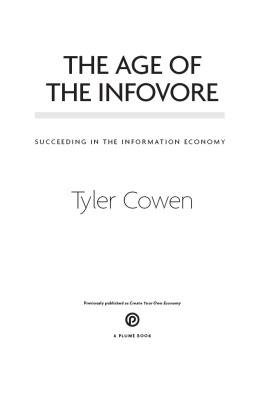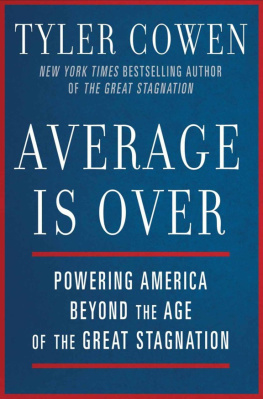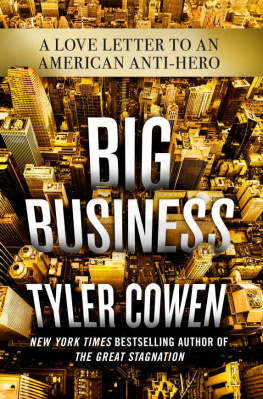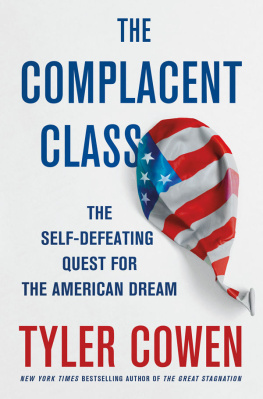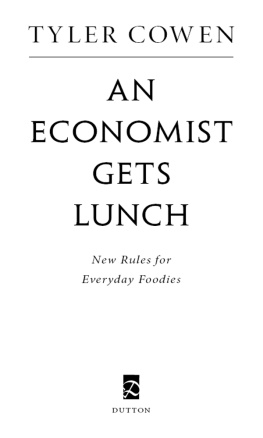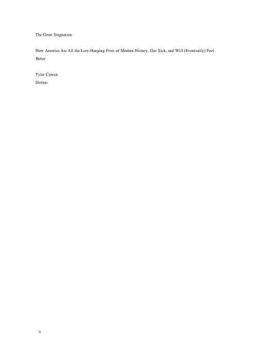Tyler Cowen - Plutocracy & Democracy: How Money Corrupts Our Politics and Culture
Here you can read online Tyler Cowen - Plutocracy & Democracy: How Money Corrupts Our Politics and Culture full text of the book (entire story) in english for free. Download pdf and epub, get meaning, cover and reviews about this ebook. year: 2012, publisher: American Interest, genre: Politics. Description of the work, (preface) as well as reviews are available. Best literature library LitArk.com created for fans of good reading and offers a wide selection of genres:
Romance novel
Science fiction
Adventure
Detective
Science
History
Home and family
Prose
Art
Politics
Computer
Non-fiction
Religion
Business
Children
Humor
Choose a favorite category and find really read worthwhile books. Enjoy immersion in the world of imagination, feel the emotions of the characters or learn something new for yourself, make an fascinating discovery.

- Book:Plutocracy & Democracy: How Money Corrupts Our Politics and Culture
- Author:
- Publisher:American Interest
- Genre:
- Year:2012
- Rating:3 / 5
- Favourites:Add to favourites
- Your mark:
- 60
- 1
- 2
- 3
- 4
- 5
Plutocracy & Democracy: How Money Corrupts Our Politics and Culture: summary, description and annotation
We offer to read an annotation, description, summary or preface (depends on what the author of the book "Plutocracy & Democracy: How Money Corrupts Our Politics and Culture" wrote himself). If you haven't found the necessary information about the book — write in the comments, we will try to find it.
Tyler Cowen: author's other books
Who wrote Plutocracy & Democracy: How Money Corrupts Our Politics and Culture? Find out the surname, the name of the author of the book and a list of all author's works by series.
Plutocracy & Democracy: How Money Corrupts Our Politics and Culture — read online for free the complete book (whole text) full work
Below is the text of the book, divided by pages. System saving the place of the last page read, allows you to conveniently read the book "Plutocracy & Democracy: How Money Corrupts Our Politics and Culture" online for free, without having to search again every time where you left off. Put a bookmark, and you can go to the page where you finished reading at any time.
Font size:
Interval:
Bookmark:

The American Interest ebook
1730 Rhode Island Avenue NW
Washington, DC 20036
www.the-american-interest.com
All rights reserved. No part of this publication may be reproduced or transmitted in any form or by any means, electronic or mechanical, including photocopy, recording, or any information storage and retrieval system, without permission in writing from the publisher.
The American Interest, 2012
eBook ISBN 978-0-9883186-0-1
Contents
Editors Forward
This book is a compendium of essays that have appeared in the pages of The American Interest in recent years. Many of them saw light of day together in a special Winter 2011 issue on plutocracy and democracy. Others were published either shortly before or after that special issue. All the essays examine some aspect of plutocratic corruption in the contemporary United States. With only very modest exceptions, the essays read today as they did when published. A few of the titles have been altered, however, since what works best in a magazine does not necessarily do so in a book.
We at The American Interest have taken a concentrated look at this topic because we think it accounts for a large part of the variance in explaining what has happened to our country in recent decades. We do not claim that plutocracy is the only source of dysfunction in the contemporary American political economy. As the next book in this series will argue, difficulties in adjusting to both globalization and automation have given us fits, and the decay, distortion and ossification of Americas political institutions are by no means insignificant. But both of these sources of trouble have been magnified, entangled together and made more difficult to rectify by the various manifestations of plutocratic corruption.
By plutocracy, we do not mean simply the tendency for wealthier members of society to become the ruling elite. If that were all plutocracy meant, it would not mean very much because it would describe practically every political arrangement since the Flood. No, by plutocracy we mean the more or less systematic manipulation of political and economic processes in such a way that the riches of the wealthy are protected and expanded at the expense of others. As is made clear in these essays, there are essentially five means by which this may be done: by getting government to extract payment to regulate industries from taxpayers rather than from the profitable industries being regulated; by torquing the tax code in favor of the rich; by influencing the results of electoral politics; by ensuring maximum freedom to lobby, since that keeps the way open for more general influence; and by securing the lions share of government contract work so as to raise barriers to entry from sectoral competitors in the economy at large.
All five of these modalities of plutocratic behavior are examined in this volume. Some essays are more historically grounded than others; some are more philosophical than others. Most are even-tempered; a few express some controlled anger. But while methods and temperaments may differ, all of the authors take aim at the same general target. And all do so within the scholarly canon, an important distinction when dealing with a subject that has been the brunt of many a conspiracy theory over the years.
My role in all this has been modest. With the consent and encouragement of the publisher and both the chairman and the executive committee of the magazines editorial board, I have solicited, edited and otherwise made ready for public reception all the essays in this book. I have also chosen which essays from the inventory of The American Interest to include and which to leave aside for this volume. Only a single essay within is my own, so credit for any merit the volume may offer clearly resides with the pantheon of authors included herein. It has been an education as well as a pleasure to deal with such fine and dedicated scholars.
Let me also note the enormous contribution my staff has made to this excellent product. The magazines managing editor, Daniel Kennelly, and associate editor, Noelle Daly, laid hands on each and every one of these essays as they went through the editing process, and every one of them is much the better for it. Lindsey Burrows is responsible for the beautiful graphic presentation we offer, and has managed to wrangle the text into the convenient and vividly readable E-format before you. Damir Marusic has helped shepherd the process along and keep it reasonably on schedule.
Finally and above all, each and every reader of this book, as well as every author represented in it, has to thank Charles Davidson, the publisher of The American Interest , for its very existence. There are many generous people on this earth, and God bless them for it; but generosity without vision runs the risk of spending itself without lasting benefit. To want so very much, as Charles Davidson does, to raise the general level of intellectual sophistication on matters of policy and politics at a time when most trends point in the other direction is a sign not just of vision, but of faith as well. We can only hope that his faith is vindicated by all our exertions in the longer run.
Adam Garfinkle
Washington, DC
September 11, 2012

Chapter 1
Terms of Contention
Adam Garfinkle
C onsider this old yet still active question: What is the relationship between the inequality arising from a mixed but predominantly market-based American economy and the equality principle embedded in American political culture? More specifically, the tension to which the question points resides in this standard observation: Individual citizens (not to speak of corporate entities) vary so considerably in how much money they can devote to political objectives that it hollows out the practical meaning of the one-man/one-vote principle at the core of American democracy. While each vote is worth the same in theory, in practice the extent to which individuals can influence voting behavior, not to speak of the behavior of legislators once elected, is not even remotely equal. That uneven playing field can be frozen over with strategic infusions of cold cash, affecting political behavior well beyond economic and tax policies. What, then, does it really mean for Americans to say that they live in a democracy?
Again, awareness of this tension, one essentially between political philosophy and political sociology, is not new. Nor is it easily fobbed off with the assurance that the political leverage afforded by wealth balances itself out in the end because the rich constitute a politically diverse group. That assurance did not comfort James Madison, who expressed concern about how an inequality of property wealth drove the formation of factions:
From the protection of different and unequal faculties of acquiring property, the possession of different degrees and qualities of property immediately results; and from the influence of these on the sentiments and views of the respective proprietors, ensues a division of the society into different interests and parties.
At a time when the line between political parties and interest groups had yet to be drawn, Madison defined factions as a number of citizens, whether amounting to a majority or a minority of the whole, who are united and actuated by some common impulse of passion, or of interest, adverse to the rights of other citizens, or to the permanent and aggregate interests of the community . While Madison was thinking along what we recognize today as class lines, John Adams opined even more broadly that the commercial way of life itself could harm republican virtue: Commerce produces money, money Luxury, and all three are incompatible with Republicans.
Next pageFont size:
Interval:
Bookmark:
Similar books «Plutocracy & Democracy: How Money Corrupts Our Politics and Culture»
Look at similar books to Plutocracy & Democracy: How Money Corrupts Our Politics and Culture. We have selected literature similar in name and meaning in the hope of providing readers with more options to find new, interesting, not yet read works.
Discussion, reviews of the book Plutocracy & Democracy: How Money Corrupts Our Politics and Culture and just readers' own opinions. Leave your comments, write what you think about the work, its meaning or the main characters. Specify what exactly you liked and what you didn't like, and why you think so.

